省略if的虚拟条件句
高中英语倒装句讲解以及习题(附答案)
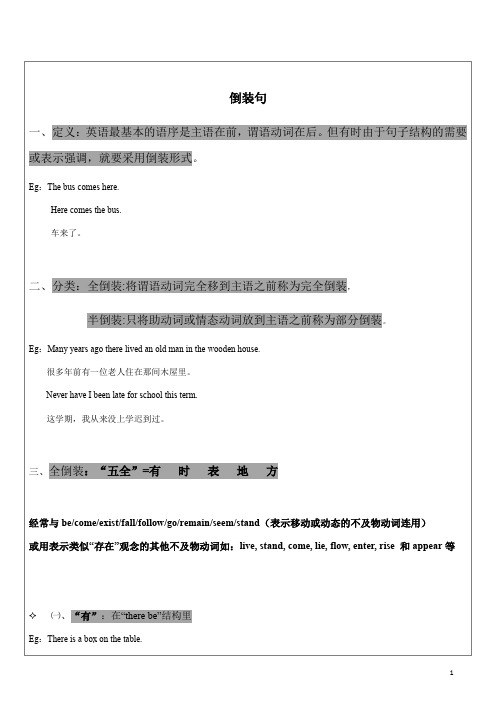
倒装句一、定义:英语最基本的语序是主语在前,谓语动词在后。
但有时由于句子结构的需要或表示强调,就要采用倒装形式。
Eg:The bus comes here.Here comes the bus.车来了。
二、分类:全倒装:将谓语动词完全移到主语之前称为完全倒装,半倒装:只将助动词或情态动词放到主语之前称为部分倒装。
Eg:Many years ago there lived an old man in the wooden house.很多年前有一位老人住在那间木屋里。
Never have I been late for school this term.这学期,我从来没上学迟到过。
三、全倒装:“五全”=有时表地方经常与be/come/exist/fall/follow/go/remain/seem/stand(表示移动或动态的不及物动词连用)或用表示类似“存在”观念的其他不及物动词如:live, stand, come, lie, flow, enter, rise 和appear等㈠、“有”:在“there be”结构里Eg:There is a box on the table.桌子上面有一个盒子。
✧㈡、“时”:表示时间副词,如:now,then,Eg:Now comes your turn.现在轮到你了。
✧㈢、“表”:表语放句子前,“表语+系动词+主语”的结构Eg:Present at the party were Mr. Green and many other guests.格林先生和其他的客人在这个聚会上。
Seated on the ground are a group of young men.一群年轻人坐在了地上。
✧㈣、“地”:地点状语放在句首Eg:In south of the river lies a small factory.小工厂位于河的南方。
From the valley came a cry.山谷传来一阵哭声。
虚拟条件句中if的隐含或省略

虚拟条件句中if的隐含或省略语言是灵活多变的,表达是丰富多彩的。
有的时候虚拟语气的表现形式也显得非常灵活,比如就说其中的虚拟条件吧——它有时会以if从句来表示,但有时会用某种短语来表示,比如不定式短语、分词短语、介词短语等等。
1. if的隐含I should be happy to go with you.如果能与你一起去,我将很高兴。
句中的不定式短语to go with you就是表示虚拟条件的,它相当于if I could go with you。
这句话的言外之意是:可惜我不一定有机会同你一起去。
To have studied harder, you would have passed the examination.你学习更用功些,你早就考及格了。
句中的不定式短语to have studied harder也是表示虚拟条件的,它相当于if you had studied harder。
句子的言外之意是:可惜你当时没有更用功我,所以你就没有考及格。
Failing this time, what would you do?假若这次失败,那你怎么办?句中的分词短语failing this time表示虚拟条件,相当于if you failed this time。
其言外之意是:尽管失败的可能性很小,但还是有可能会失败,假若失败了,那怎么办?Without your help, we couldn’t have succeeded.如果没有你的帮助,我们就不会取得成功。
句中的介词短语without your help表示虚拟条件,相当于if you hadn’t given us help。
其言外之意是:好在你帮助了我们,所以我们取得了成功。
I didn’t know that he was a cheat, or else I wouldn’t have believed him.我不知道他是个骗子,不然我也不会相信他了。
高考英语虚拟语气历年考点分析
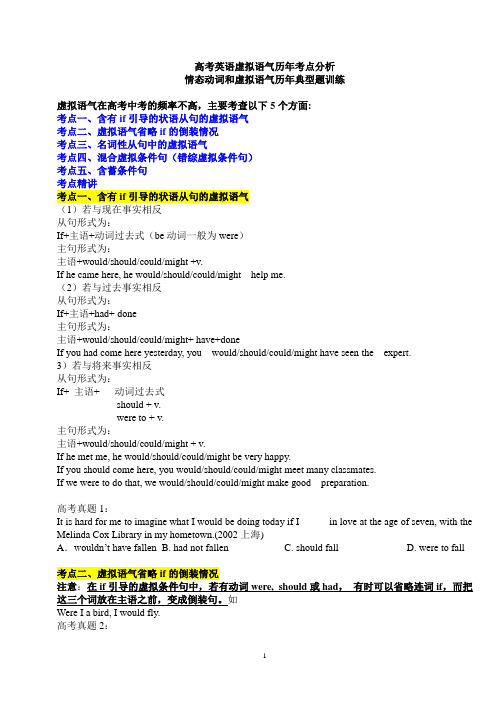
高考英语虚拟语气历年考点分析情态动词和虚拟语气历年典型题训练虚拟语气在高考中考的频率不高,主要考查以下5个方面:考点一、含有if引导的状语从句的虚拟语气考点二、虚拟语气省略if的倒装情况考点三、名词性从句中的虚拟语气考点四、混合虚拟条件句(错综虚拟条件句)考点五、含蓄条件句考点精讲考点一、含有if引导的状语从句的虚拟语气(1)若与现在事实相反从句形式为:If+主语+动词过去式(be动词一般为were)主句形式为:主语+would/should/could/might +v.If he came here, he would/should/could/might help me.(2)若与过去事实相反从句形式为:If+主语+had+ done主句形式为:主语+would/should/could/might+ have+doneIf you had come here yesterday, you would/should/could/might have seen the expert.3)若与将来事实相反从句形式为:If+ 主语+ 动词过去式should + v.were to + v.主句形式为:主语+would/should/could/might + v.If he met me, he would/should/could/might be very happy.If you should come here, you would/should/could/might meet many classmates.If we were to do that, we would/should/could/might make good preparation.高考真题1:It is hard for me to imagine what I would be doing today if I _____ in love at the age of seven, with the Melinda Cox Library in my hometown.(2002上海)A.wouldn’t have fallen B. had not fallen C. should fall D. were to fall考点二、虚拟语气省略if的倒装情况注意:在if引导的虚拟条件句中,若有动词were, should或had,有时可以省略连词if,而把这三个词放在主语之前,变成倒装句。
虚拟条件句中if的隐含或省略

I: 最基本的虚拟语气句型:1. 虚拟现在时表示与现在事实相反的假设,其if 从句的谓语形式用动词的过去式(be 一般用were),主句用would/ should/ could/ might +动词原形。
If places were alike, there would be little need for geographers.如果各个地方都一样,就不需要地理学家了。
2. 虚拟过去时是表示与过去事实相反的假设,if 从句的谓语形式用过去完成时即had+过去分词,主句用would / should / could / might + have +过去分词。
If he had known your address yesterday,he would have telephoned you.3. 虚拟将来时是表示对将来实现的可能性很小的或不确定的假设。
If从句的谓语形式用一般过去式或用were to / should +动词原形,主句用would / should/could/ might +动词原形。
If he were to leave today, he would get there by Friday4. 省略if 采用倒装语序的条件句。
有时可以把含有助动词、情态动词、be 或have的虚拟条件句中的连词if省去,而将had , should, were 等词提到主语之前,即用倒装结构。
If he had worked harder, he would have got through the exams.==>Had he worked harder, he would have got through the exams.If he were to leave today, he would get there by Friday.==>Were he to leave today, he would get there by Friday.If I were in your place, I wouldn‟t do that.==>WereI in your place, I wouldn‟t do that.5. 有时虚拟条件句并没用if 从句表示出来,而是用介词短语(otherwise, or, without, but for)、上下文或其它方式来表示。
if引导的虚拟条件句
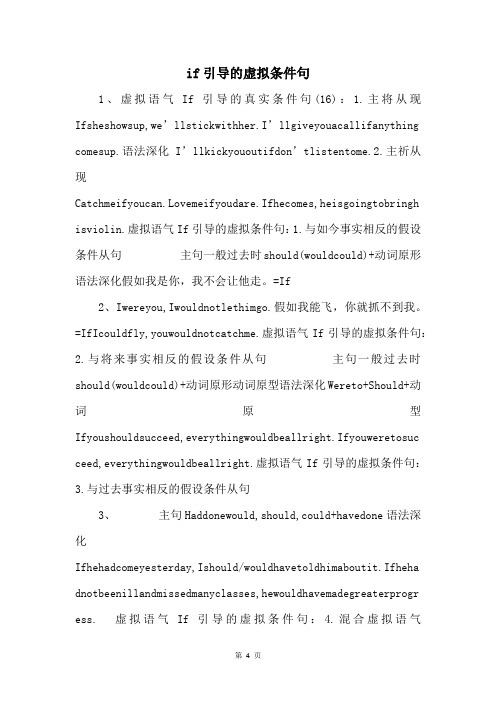
if引导的虚拟条件句1、虚拟语气If引导的真实条件句(16):1.主将从现Ifsheshowsup,we’llstickwithher.I’llgiveyouacallifanything comesup.语法深化I’llkickyououtifdon’tlistentome.2.主祈从现Catchmeifyoucan.Lovemeifyoudare.Ifhecomes,heisgoingtobringh isviolin.虚拟语气If引导的虚拟条件句:1.与如今事实相反的假设条件从句主句一般过去时should(wouldcould)+动词原形语法深化假如我是你,我不会让他走。
=If2、Iwereyou,Iwouldnotlethimgo.假如我能飞,你就抓不到我。
=IfIcouldfly,youwouldnotcatchme.虚拟语气If引导的虚拟条件句:2.与将来事实相反的假设条件从句主句一般过去时should(wouldcould)+动词原形动词原型语法深化Wereto+Should+动词原型Ifyoushouldsucceed,everythingwouldbeallright.Ifyouweretosuc ceed,everythingwouldbeallright.虚拟语气If引导的虚拟条件句:3.与过去事实相反的假设条件从句3、主句Haddonewould,should,could+havedone语法深化Ifhehadcomeyesterday,Ishould/wouldhavetoldhimaboutit.Ifheha dnotbeenillandmissedmanyclasses,hewouldhavemadegreaterprogr ess.虚拟语气If引导的虚拟条件句:4.混合虚拟语气Ifyou_______himyesterday,you______whattodonow.(ask,know)语法深化〔从句与过去事实相反,主句与如今事实相反。
虚拟语气

虚拟语气一、虚语语气表示说话人的一种愿望、建议、命令、要求。
有时是一种非真实的假设、料想,或是不可能实现的与事实相反的愿望。
二、虚拟语气的种类1. if引导的虚拟条件句(退一步,海阔天空)(1)与现在相反If + did (were), wmcs + do①如果我是你,我会再试一次。
If I were you, I would try it again.②如果我有一百万美元,我会买下这架飞机。
If I had one million dollars, I would buy the plane.(2)与过去相反If +had done sth, wmcs + have done①如果他努力学的话,他就会通过考试。
If he had worked hard, he would have passed theexamination.②要是当时我和她结了婚的话,那我是很不幸的。
If I had married her, I would have been unhappy.(3)与将来相反If + didwere to do , wmcs + doshould do译:如果他明天来的话,我会告诉他.If he were to come here tomorrow, I would tell him.练一练:①If you __________tomorrow, you _________ find the new manager working in the office.A. should come; wouldB. would come; wouldC. will come; shouldD. comes; might②If the parents ______at the hospital earlier after the accident, the child would have been saved.A. arrivesB. arriveC. had arrivedD. has arrived③---If he ________; he ________that food.---Luckily he was sent to the hospital immediately.A. was warned; would not have takenB. had been warned; would not have takenC. would be warned; had not takenD. would have been warned; had not taken 2. 虚拟句易考点(1)省略if,倒装的条件句:如果从句中有were, had, should时, 可把从句倒装①If I were you, I would try it again.→Were I you, I would try it again.②If he had been there yesterday, he would have seen thefilm.→Had he been there yesterday, he would have seen thefilm.③If it should snow tomorrow, we wouldn’t go out.→Shou ld it snow tomorrow, we wouldn’t go out.练一练①_________the exam, he would have attend a college.A. If he passedB. Had he passedC. Were he passedD. If he should pass②_______five minutes earlier, you could have seenthem off.A. If you should arriveB. If you arriveC. Had you arrivedD. Should you arrive③________it rain tomorrow, we should have to putoff the visit to the Science Museum.A. WereB. shouldC. wouldD. will(2)wish did/were 现在If only had done 过去as if wmc do 将来①我要是记得地址就好了。
英语语法知识虚拟语气

【导语】在⼤学英语六级考试中,单独考察六级语法的题型不多,但是语法知识点却贯穿整张试卷,下⾯是⽆忧考为⼤家整理的基础语法知识——虚拟语⽓。
1. 表⽰现在/过去/将来情况的虚拟条件句虚拟条件句主要有三种结构:1) 表⽰与现在情况相反:主句谓语⽤“would / could / might +动词原形”,从句谓语⽤“动词的⼀般过去时”(动词be的过去式⼀律⽤were)。
If I were you, I would not accept his offer.If I had time, I would certainly go to the cinema with you.2) 表⽰与过去情况相反:主句谓语⽤“would / could / might + have +过去分词”,从句谓语⽤过去完成时。
If I had got up a little earlier, I wouldn’t have missed the train.If I had been more careful, I might have passed that exam.3) 表⽰与将来情况相反:主句谓语⽤“would / could / might +动词原形”,从句谓语⽤“were +动词不定式”或“should +动词原形”。
If I were to do the job, I would not be able to have enough time to study.If it should rain tomorrow, I would not go out with you.2. 虚拟条件句连接词if的省略如果虚拟条件句的从句中含有were, had, should, could等词时,可以省略连接词if,但这时必须把were, had, should, could等词移到主语前⾯,形成倒装。
这种句型主要⽤于书⾯形式。
虚拟语气15种句型
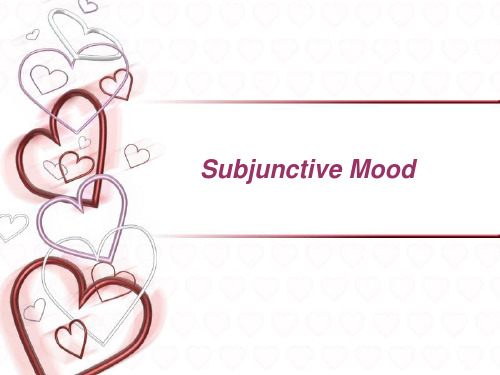
3.as if / as though后的表语或状语从句 (与wish相同)
含义 动 词 形 式
例句
现在 did / were
He looks as if he knew the little girl.
过去 Have done
It appeared as if nothing had
happened.
5.动词形式为(should)+do 的虚拟
2. It’s + adj.+that 的主语从句 (adj: necessary / essential/
important / natural / strange / possible / impossible
eg. It is important that we should attend the meeting.
• 对过去的猜测 • 肯定 must have done • 否定 can / could not have done • 可能 may / might have done
• 本应该做(实际没有做,有责备意思) • should have done • shouldn’t have done • 本来有必要作(实际没有做,不含责
desire 命令:order / command/ 坚持:insist 不管是动词还是名词,不管是主动还是被动
,不管是引导主语从句, 宾语从句, 表语 从句还是同位语从句, 都要用(should) do
5.动词形式为(should)+do 的虚拟
• My suggestion is that we should listen to his opinion first.
It is time that we stopped work and went home.
if条件句省略
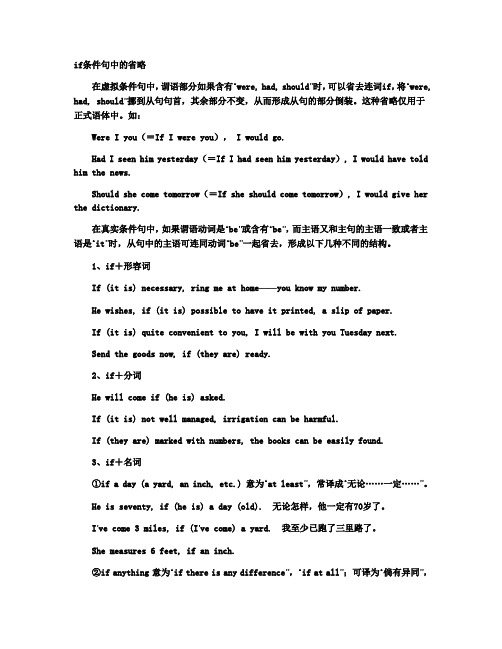
if条件句中的省略在虚拟条件句中,谓语部分如果含有“were, had, should”时,可以省去连词if,将“were, had, should”挪到从句句首,其余部分不变,从而形成从句的部分倒装。
这种省略仅用于正式语体中。
如:Were I you(=If I were you), I would go.Had I seen him yesterday(=If I had seen him yesterday), I would have told him the news.Should she come tomorrow(=If she should come tomorrow), I would give her the dictionary.在真实条件句中,如果谓语动词是“be”或含有“be”,而主语又和主句的主语一致或者主语是“it”时,从句中的主语可连同动词“be”一起省去,形成以下几种不同的结构。
1、if+形容词If (it is) necessary, ring me at home——you know my number.He wishes, if (it is) possible to have it printed, a slip of paper.If (it is) quite convenient to you, I will be with you Tuesday next.Send the goods now, if (they are) ready.2、if+分词He will come if (he is) asked.If (it is) not well managed, irrigation can be harmful.If (they are) marked with numbers, the books can be easily found.3、if+名词①if a day (a yard, an inch, etc.) 意为“at least”,常译成“无论……一定……”。
虚拟语气

(succeed in) doing this experiment .
But for the meeting ,I
would have gone to
(go to) your party last Saturday .
Practice :
1 . Without electricity human life ___ quite different today . A is B will be C would have been D would be
⑤⑴否定副词+expect / believe / think /
suspect that …(should) do
⑵It’s a pity, a shame, incredible, strange, no wonder, necessary, important + that … (should) do I never expected that the problem should be so complicated.
got over the difficulties.
3.If I had had time, I would have run round that lake again. Had I had time _____________________ , I would have run round that lake again.
She insisted that a doctor be sent for at once. My suggestion is that the meeting should be put off till next Sunday. Your advice that she wait till next week is reasonable.
高考英语专题十三特殊句式
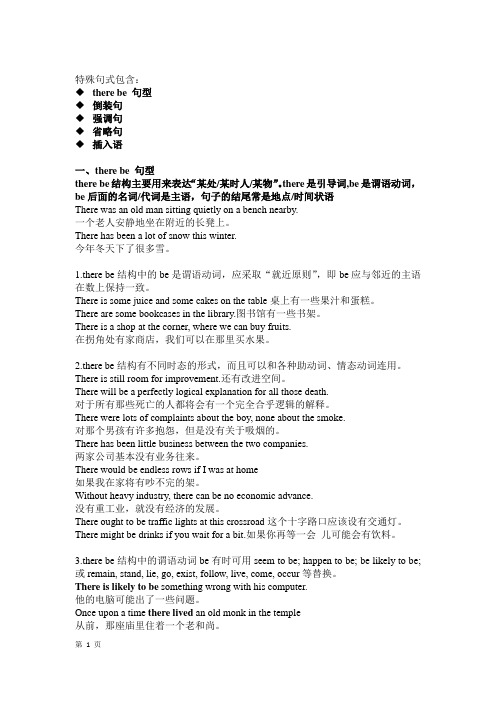
特殊句式包含:◆there be 句型◆倒装句◆强调句◆省略句◆插入语一、there be 句型there be结构主要用来表达“某处/某时人/某物”。
there是引导词,be是谓语动词,be后面的名词/代词是主语,句子的结尾常是地点/时间状语There was an old man sitting quietly on a bench nearby.一个老人安静地坐在附近的长凳上。
There has been a lot of snow this winter.今年冬天下了很多雪。
1.there be结构中的be是谓语动词,应采取“就近原则”,即be应与邻近的主语在数上保持一致。
There is some juice and some cakes on the table桌上有一些果汁和蛋糕。
There are some bookcases in the library.图书馆有一些书架。
There is a shop at the corner, where we can buy fruits.在拐角处有家商店,我们可以在那里买水果。
2.there be结构有不同时态的形式,而且可以和各种助动词、情态动词连用。
There is still room for improvement.还有改进空间。
There will be a perfectly logical explanation for all those death.对于所有那些死亡的人都将会有一个完全合乎逻辑的解释。
There were lots of complaints about the boy, none about the smoke.对那个男孩有许多抱怨,但是没有关于吸烟的。
There has been little business between the two companies.两家公司基本没有业务往来。
There would be endless rows if I was at home如果我在家将有吵不完的架。
2021年国家开放大学非英语专业学士学位英语考试真题解析第二章词语用法与语法结构(5)20秋真题解析
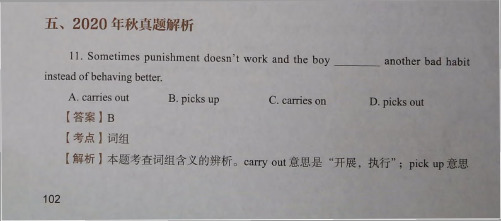
语,排除选项A。句子中leave与he之间是动宾关系,使用被动语态形式,排除选项
C、D。选项B表示“某人被留下来做某事”。根据题意可知选项B正确。
[句意】他被留下来负责管理夜总会,这让他烦扰许久。
17. Were it not for the bad weather, we
tennis at the moment.
一早。
14. We have to accept the fact and we stick to them all our lives.
most of us have been raised with certain foods
A. which
B. what
【答案】C
[考点】同位语从句
C. that
chapter of my autobiography.
A. keep up
B. stay up
C. wake up
D. jump up
【答案】B
[考点】词组
【解析】keep up意思是“赶上”,stay up意思是“熬夜”,wake up意思是“醒
来”,jump叩意思是“跳起来”。题干中的deadline指“最后期限”,与动词meet搭配
15. Running up big bills on credit cards means you'll have trouble debt when the statement arrives.
the full
A. to pay off
B. paying off
C. paid off
D. being paid off
D. picks out
【解析】本题考查词组含义的辨析。carryout意思是“开展, 执行”;pick up意思
语法:虚拟语气(一)在if 条件从句中的用法;词汇:选修6 (Unit 1)中的重点词句与表达
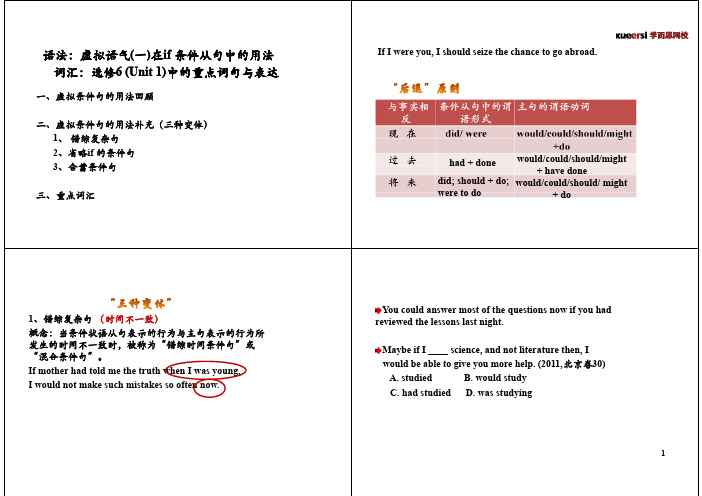
had+done would/could/should/might had + done+ have donedid; should + do; ere to do would/could/should/ mightdwere to do+ doYou could answer most of the questions now if you had reviewed the lessons last night.Maybe if I ____ science, and not literature then, I would be able to give you more help. (2011,北京卷30)A. studiedB. would studyC. had studiedD. was studying_____ I you, I would go with him to the party.But for their help, we ____ the program in time. (2009,安安徽卷,I was ill that day. Otherwise, I would have taken part in the sports meeting.They would have resisted but that they lacked courage. (= They would have resisted if they hadn’t lackedA A man who stopped drinking water would be dead in about 3days.possession possess [pə'zes]vt. 拥有;具有;支配有有支Rich people wanted to possess their own paintings, sothey could decorate the superb palaces and great houses.they could decorate the superb palaces and great houses(选修6, P 2-18)1.2.The , painter does not attempt to paint objects as we see them with our eyes, but instead concentrates on certain qualities of the object, using colour, line and shape to represent them. (选修6, P3-53)1k ff t t ith t di1.make an effort, try, esp. without succeedingHe attempted to leave but stopped. 【L.C】attempt to do; attempt doing总结一、虚拟条件句的用法回顾二、虚拟条件句的用法补充(三种变体)1、错综复杂句2、省略if 的条件句条件3、含蓄条件句三、重点词汇。
虚拟语气是谓语动词的一种特殊形式,用来表示假设、猜测

虚拟语气:是谓语动词的一种特殊形式,用来表示假设、猜测、建议、主观愿望、夸张或空想,而非客观事实。
主句与从句的动作发生在不同的时间,这是主从句中谓语动词的虚拟语气形式因时间不同而不同。
If you had asked him yesterday, you would know what to do now.If you had followed my advice just now, you would be better now.1.虚拟语气倒装形式(省略if)虚拟条件句的从句部分如果含有were, should, had可以将if省略再把上述这些词移到句首实行倒装。
If I were at school again, I would study harder. →Were I at school again, I would study harder.If you had come earlier, you would catch the bus. →Had you come earlier, you would catch the bus. If it should rain, the crops would be saved. →Should it rain, the crops would be saved.注:在倒装时,不能有缩略形式:Weren’t it for the expense (*)→Were it not for the expense2.介词短语代替条件状语从句常用词:with, but for, withoutWhat would you do with a million dollars? (=if you had a million dollars)We couldn’t have finished the work ahead of time without your help. (=if we hadn’t got your help) Without your help, we couldn’t have finished the work ahead of time. = But for your help, …= If it had not been for your help, …= Had it not been for you help, …3.含蓄条件句有在虚拟语气中并不总是出现if引导的条件句,而是通过其他手段来代替条件句。
2020年高考英语之高频考点解密十二 特殊句式(强调,倒装,祈使句,感叹句等)(含答案)
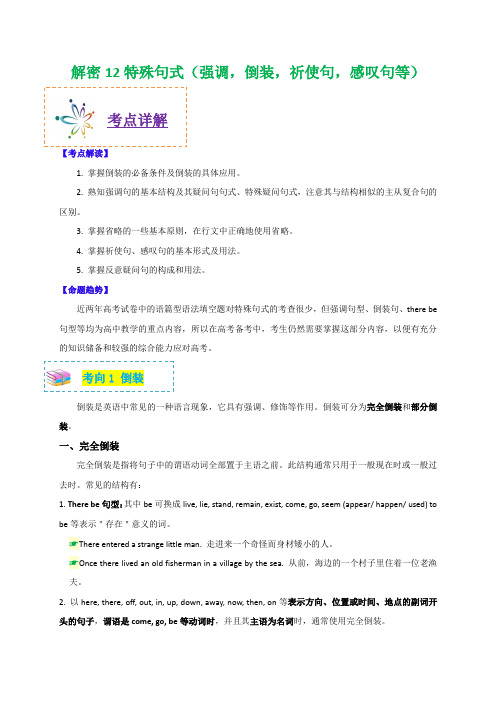
解密12特殊句式(强调,倒装,祈使句,感叹句等)考点详解【考点解读】1. 掌握倒装的必备条件及倒装的具体应用。
2. 熟知强调句的基本结构及其疑问句句式、特殊疑问句式,注意其与结构相似的主从复合句的区别。
3. 掌握省略的一些基本原则,在行文中正确地使用省略。
4. 掌握祈使句、感叹句的基本形式及用法。
5. 掌握反意疑问句的构成和用法。
【命题趋势】近两年高考试卷中的语篇型语法填空题对特殊句式的考查很少,但强调句型、倒装句、there be 句型等均为高中教学的重点内容,所以在高考备考中,考生仍然需要掌握这部分内容,以便有充分的知识储备和较强的综合能力应对高考。
考向1 倒装倒装是英语中常见的一种语言现象,它具有强调、修饰等作用。
倒装可分为完全倒装和部分倒装。
一、完全倒装完全倒装是指将句子中的谓语动词全部置于主语之前。
此结构通常只用于一般现在时或一般过去时。
常见的结构有:1. There be句型:其中be可换成live, lie, stand, remain, exist, come, go, seem (appear/ happen/ used) to be等表示"存在"意义的词。
☛There entered a strange little man. 走进来一个奇怪而身材矮小的人。
☛Once there lived an old fisherman in a village by the sea. 从前,海边的一个村子里住着一位老渔夫。
2. 以here, there, off, out, in, up, down, away, now, then, on等表示方向、位置或时间、地点的副词开头的句子,谓语是come, go, be等动词时,并且其主语为名词时,通常使用完全倒装。
☛Now, here goes the story. 现在,这个故事是这样的。
☛Then came another question. 然后又一个问题被提出来了。
倒装及强调和省略句
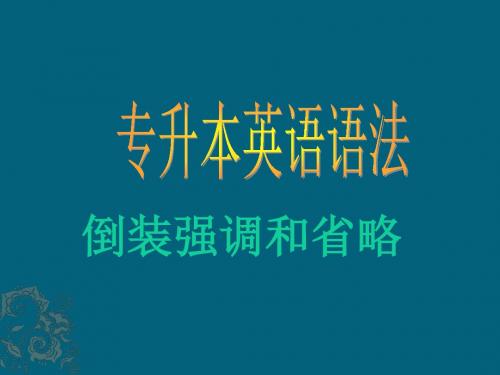
从句
主语为it且从句谓语中有 ②Though (they were)
虚拟 语气
在虚拟条件句中, 如含有 略, 句子要用倒装
had, were, should, if可省 twenty now, I would
种类
要点归纳
典句例示
动 词 不 定 式
感官动词或使役动词(如 feel, see, hear, notice, let, I heard someone 不 make, have等)后接不定 sing in the next 定 式作宾语补足语时省略 room. 式 to 符 号 ①He did nothing 在do nothing but, can’t to but wait all the time. help but, why not, would 的 ②Rather than ride rather. . . than. . . ; prefer 省 on a crowded bus, to do. . . rather than. . . 略 he always prefers to 等句型中省略to ride a bicycle.
No sooner…than… Hardly/scarcely/barely…when… e.g. No sooner had he closed his eyes _____ than the doorbell rang.(2002) when Hardly had he sat down _____the phone rang.(2010)
If I were to do it, I’d do it some other way.
Were I to do it, I’d do it some other way. If you had been here earlier, you would have seen him.
虚拟条件句中if的隐含和省略

. . . . . . . — —
c o n s u me r c o mp l a i n t s
【 分析】 答案为 A 。 w h e r e 在此引导定语从句, 其先行词为 c a s e s 。 在一般情况下 , 定语从句应
2 .F o r ma n y c i t i e s i n t h e wo r l d ,t h e r e i s n o r o o m t o s p r e a d o u t f u r t h e r ,
i s a n e x a mp l e .
中 学 英 语 之 友 . 高 三 版⑨
请 看 下 面两道 高考 题 :
1 .L a t e r i n t h i s c h a p t e r c a s e s wi l l b e i n t r o d u c e d t o r e a d e r s h a v e r e s u he d i n c h a n g e s i n t h e l a w.
— —
Ne w Yo r k
A.f o r w h i c h
B.i n w h i c h
C .o f wh i c h
D.f r o m w h i为 c 。 o f w h i c h 在此引导非限制性定语从句 , 其先行词为前面的 m a n y c i t i e s 。 通 1 常 情况 , 定语 从 句应 紧跟 在先 行词 之后 , 其 间不 能插人 其他 成分 , 但 在本 题 中 , 定语 从 句与先 行
【 分析】 旬 中的 h a d不 是构 成 过去完 成 时 的助动 词 , 而是 表示 “ 有” , 如果不 省 略 i f , 其完 整形
if 非真实条件句中的虚拟语气
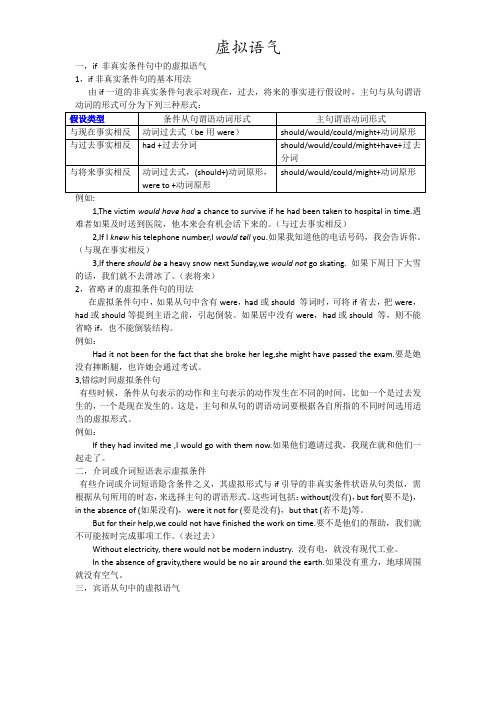
一,if 非真实条件句中的虚拟语气1,if非真实条件句的基本用法由if一道的非真实条件句表示对现在,过去,将来的事实进行假设时,主句与从句谓语动词的形式可分为下列三种形式:1,The victim would have had a chance to survive if he had been taken to hospital in time.遇难者如果及时送到医院,他本来会有机会活下来的。
(与过去事实相反)2,If I knew his telephone number,I would tell you.如果我知道他的电话号码,我会告诉你。
(与现在事实相反)3,If there should be a heavy snow next Sunday,we would not go skating. 如果下周日下大雪的话,我们就不去滑冰了。
(表将来)2,省略if的虚拟条件句的用法在虚拟条件句中,如果从句中含有were,had或should 等词时,可将if省去,把were,had或should等提到主语之前,引起倒装。
如果居中没有were,had或should 等,则不能省略if,也不能倒装结构。
例如:Had it not been for the fact that she broke her leg,she might have passed the exam.要是她没有摔断腿,也许她会通过考试。
3,错综时间虚拟条件句有些时候,条件从句表示的动作和主句表示的动作发生在不同的时间,比如一个是过去发生的,一个是现在发生的。
这是,主句和从句的谓语动词要根据各自所指的不同时间选用适当的虚拟形式。
例如:If they had invited me ,I would go with them now.如果他们邀请过我,我现在就和他们一起走了。
二,介词或介词短语表示虚拟条件有些介词或介词短语隐含条件之义,其虚拟形式与if引导的非真实条件状语从句类似,需根据从句所用的时态,来选择主句的谓语形式。
公开课-虚拟语气在if条件句中的用法1
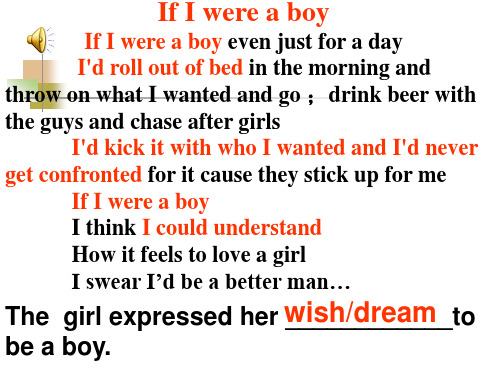
When(时间)
Structure (结构)
与_过_去__事_o_n_e_(动_词_过__去_分_词_)_…_, sbw__ou__ld__(n_o_t_) _h_a_v_e_d_o_n_e_(动. 词过去分词)
Practice 2
1.I __w_o_u_l_d_h_a_v_e__s_tu_d_i_e_d (study) English when I was a child if I __h_a_d_k_n_o_w__n_______(know) the importance (重要性)of it.
are thinking.
Two-year-old:
If I __c_o_u_l_d__(can) talk, I __w_o_u__ld__te_l_l___(tell) my mother that I hate peas.
14 year-old:
I ___w_o_u_l_d_b_e____(be) happier if I _c_o_u_l_d__(can) drive.
3. Eason doesn’t think he will ever win a singing Competition(比赛). If, by chance, he
_w_e_r_e__to__w_i_n_/s_h_o_u_l_d__w_i_n_/w_on (win), he __w_o_u_l_d_s_p_e_n_d_ (spend) the prize money on a computer.
If you had worked hard ,you would have passed the exam .
If they had had enough rain last year, they would have gained good harvest.
- 1、下载文档前请自行甄别文档内容的完整性,平台不提供额外的编辑、内容补充、找答案等附加服务。
- 2、"仅部分预览"的文档,不可在线预览部分如存在完整性等问题,可反馈申请退款(可完整预览的文档不适用该条件!)。
- 3、如文档侵犯您的权益,请联系客服反馈,我们会尽快为您处理(人工客服工作时间:9:00-18:30)。
省略if的虚拟条件句
虚拟条件句的从句部分含有were, should, 或had时, 可省略if,再把were, should或had 移到从句的句首,实行倒装。
例如:
Were they here now, they could help us. =If they were here now, they could help us.他们现在在的话,就会帮助我们了。
Had you come earlier, you would have met him.
=If you had come earlier, you would have met him.
你来得早一点,就碰到他了。
Should it rain, the crops would be saved. =If it should rain, the crops would be saved.假如下雨,庄稼就有救了。
注意:在虚拟语气的从句中,动词'be'的过去时态一律用"were",不用was,即在从句中be用were代替。
例如:If I were you, I would go to look for him.
如果我是你,就会去找他。
If he were here, everything would be all right. 如果他在这儿,一切都会好的。
典型例题_____ to do the work, I should do it some other day.
A. If were I
B. I were
C. Were I
D. Was I
答案 C. 在虚拟条件状语中如果有were, should, had这三个词,通常将if省略,主语提前, 变成were, should, had +主语的形式。
